| |||||
| Decades: | |||||
|---|---|---|---|---|---|
| See also: | |||||
Events in the year 2009 in Chad .
In general, the year was mostly one with rampant negative issues regarding political instability and other undesirable conditions of a country.
| |||||
| Decades: | |||||
|---|---|---|---|---|---|
| See also: | |||||
Events in the year 2009 in Chad .
In general, the year was mostly one with rampant negative issues regarding political instability and other undesirable conditions of a country.
Déby and Abbas were incumbent throughout the year following the 2006 Chadian presidential election, in which Déby had won a majority of the votes.
Chad, officially the Republic of Chad, is a landlocked country in Central Africa. It borders Libya to the north, Sudan to the east, the Central African Republic to the south, Cameroon and Nigeria to the southwest, and Niger to the west. Due to its distance from the sea and its largely desert climate, the country is sometimes referred to as the "Dead Heart of Africa".
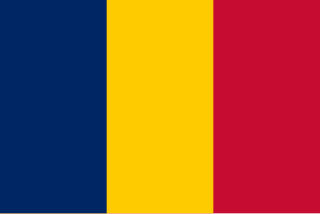
Chad, officially the Republic of Chad, is a landlocked country located at the crossroads of North and Central Africa. It is bordered by Libya to the north, Sudan to the east, the Central African Republic to the south, Cameroon to the southwest, Nigeria to the southwest, and Niger to the west. Chad has a population of 16 million, of which 1.6 million live in the capital and largest city of N'Djamena. With a total area of around 1,300,000 km2 (500,000 sq mi), Chad is the fifth-largest country in Africa and the twentieth largest nation by area in the world.

Idriss Déby Itno was a Chadian politician and military officer who was the 6th president of Chad from 1991 until his death in 2021 during the Northern Chad offensive. His term of office of more than 30 years makes him Chad's longest-serving president.
Adré is the main town of the Assoungha department in the Ouaddaï Region of Chad. It is located very close to Chad's eastern border with Sudan, 400m away. The town is served by Adré Airport.

The Chadian Civil War of 2005–2010 began on December 18, 2005. Since its independence from France in 1960, Chad has been swamped by civil wars between the Arab-Muslims of the north and the Sub-Saharan-Christians of the south. As a result, leadership and presidency in Chad drifted back and forth between the Christian southerners and Muslim northerners. When one side was in power, the other side usually started a revolutionary war to counter it.
Operation Épervier was the French military presence in Chad from 1986 until 2014.

The War in Darfur, also nicknamed the Land Cruiser War, was a major armed conflict in the Darfur region of Sudan that began in February 2003 when the Sudan Liberation Movement (SLM) and the Justice and Equality Movement (JEM) rebel groups began fighting against the government of Sudan, which they accused of oppressing Darfur's non-Arab population. The government responded to attacks by carrying out a campaign of ethnic cleansing against Darfur's non-Arabs. This resulted in the death of hundreds of thousands of civilians and the indictment of Sudan's president, Omar al-Bashir, for genocide, war crimes, and crimes against humanity by the International Criminal Court.
Events from the year 2007 in Chad.
The Battle of N'Djamena began on February 2, 2008, when Chadian rebel forces opposed to Chadian President Idriss Déby entered N'Djamena, the capital of Chad, after a three-day advance through the country. The rebels were initially successful, taking a large part of the city and attacking the heavily defended presidential palace. They did not capture the palace, and after two days of fighting they withdrew to outside the city. Around two days later they retreated east.
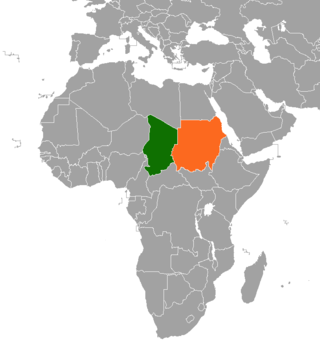
The populations of eastern Chad and western Sudan established social and religious ties long before either nation's independence, and these remained strong despite disputes between governments. In recent times, relations have been strained due to the conflict in Darfur and a civil war in Chad, which both governments accuse the other of supporting.
The following details notable events from the year 2008 in Chad. Chad is a landlocked country in Central Africa. It is bordered by Libya to the north, Sudan to the east, the Central African Republic to the south, Cameroon and Nigeria to the southwest, and Niger to the west.
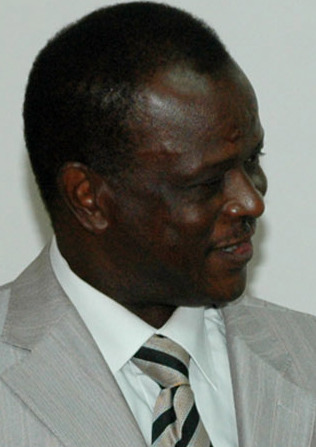
Emmanuel Djelassem Nadingar is a Chadian politician who served as Prime Minister of Chad from March 2010 to January 2013.
This article is a list of events in the year 2005 in Chad.

The Military Command Council for the Salvation of the Republic is a Chadian militant rebel group that seeks to overthrow the government of Chad. Founded in 2016, it currently operates in the border regions of northern Chad, southern Libya, eastern Niger, and western Sudan. The CCMSR has become involved in the Second Libyan Civil War, and took control of the Kouri Bougoudi area in northern Chad in 2018.
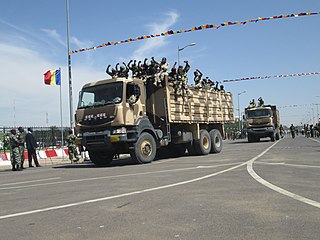
Operation Boma's Wrath was a military operation launched by Chad against Boko Haram. Operation was launched on March 31, 2020, one week after Boko Haram's attack on Chadian military base in which 92 Chadian soldiers were killed. Aim of the operation was to destroy hidden jihadist bases and repulse their forces out of Chad. Operation lasted 10 days and according to Chadian military it resulted in roughly 1000 insurgents killed, their bases in Chad destroyed, and capture of arms caches previously taken from Chad.
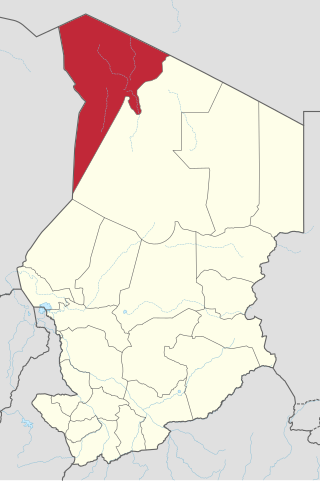
The Northern Chad offensive was a military offensive in Northern Chad, initiated by the Chadian rebel group Front for Change and Concord in Chad (FACT), took place from 11 April to 9 May 2021. It began in the Tibesti Region in the north of the country following the 2021 Chadian presidential election.

In 2016, the Front for Change and Concord in Chad (FACT) and the Military Command Council for the Salvation of the Republic (CCMSR) began a rebellion against the Chadian government. From their rear bases in southern Libya, FACT and CCMSR have launched offensives and raids into Northern Chad seeking to overthrow the government of former president Idriss Déby, who had been in power since a December 1990 coup. Other rebel groups are also involved in the insurgency, though to a lesser extent.
Events in the year 2011 in Chad.
Events in the year 2022 in Chad.
Events in the year 2023 in Chad.